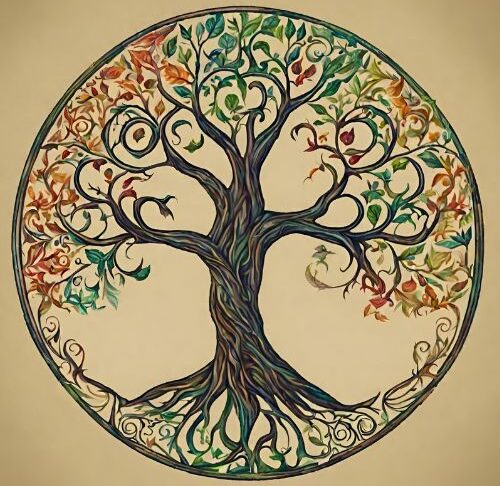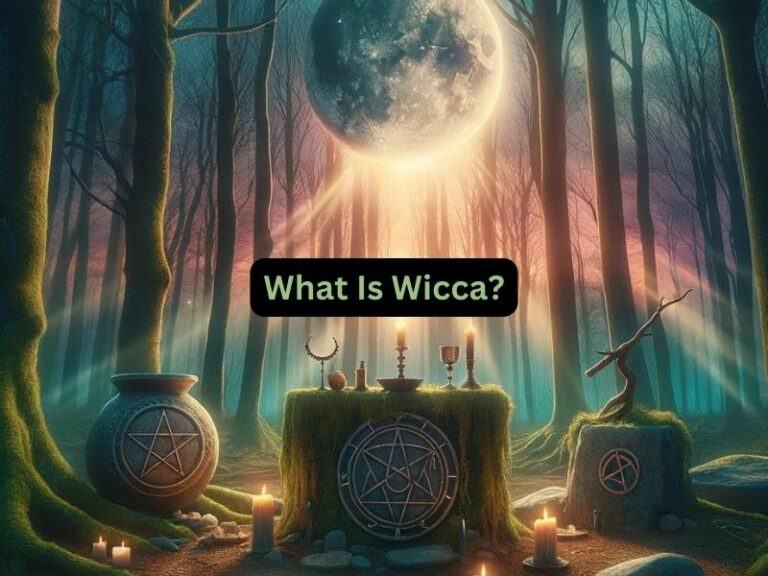Wicca is a modern religion about nature. If you feel a strong connection to the natural world and like the idea of spiritual practices that celebrate the earth’s cycles, Wicca might be interesting to you. Gerald Gardner started Wicca in the mid-20th century, and it has since become a diverse spiritual path that many people find meaningful and satisfying.
At its heart, Wicca is about honoring the sacred in nature and recognizing the divine energy that exists in all living things. It’s a religion that encourages you to create your own spiritual journey, trust your gut feelings, and live in harmony with the world around you.
So, if you’re curious about exploring a spirituality that focuses on personal growth, taking care of the environment, and balancing feminine and masculine energies, learning more about Wicca could be a great starting point.
Core beliefs
At the heart of Wicca are a few key beliefs that shape how Wiccans see the world and their place in it.
A deep respect for nature
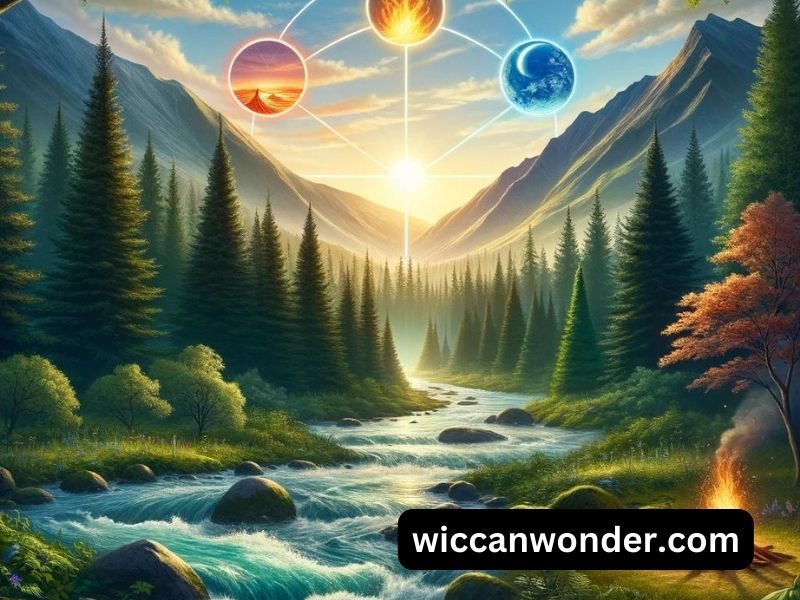
Wiccans see nature as special and sacred, filled with a divine or spiritual energy. They honor the cycles of the sun, moon, and seasons, understanding that all life is connected and that living in harmony with the earth is important.
Worship of the Goddess and God
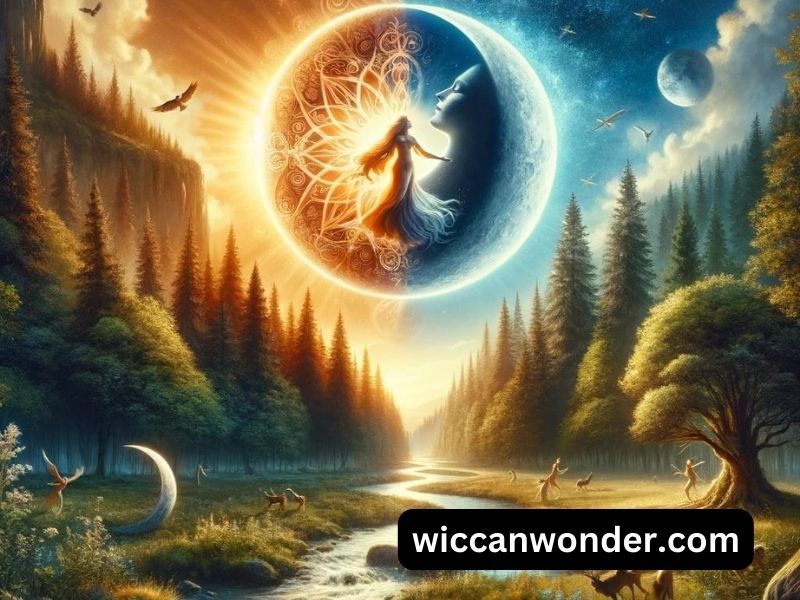
The Goddess represents the divine feminine – things like nurturing, intuition, and the mysteries of birth, death, and rebirth. The God represents the divine masculine – things like strength, protection, and the wild forces of nature. Wiccans try to balance and honor both of these energies, seeing them as complementary rather than opposed.
Personal responsibility and ethics
Wicca also emphasizes personal responsibility and ethics along with this respect for the divine feminine and masculine.
The Wiccan Rede, a guiding principle of the religion, states, “If it harms none, do what you will.” This encourages you to follow your own path and make your own choices, but always with the understanding that your actions shouldn’t harm others.
The Threefold Law suggests that whatever energy you put into the world will return to you three times as strong, emphasizing the importance of acting with kindness and integrity.
By living these core beliefs—respect for nature, balance between the Goddess and God, and commitment to personal responsibility—you can begin to walk the Wiccan path with confidence and purpose.
Practices
As you explore Wicca, you’ll discover various practices that help you embody the religion’s core beliefs.
Rituals and Ceremonies
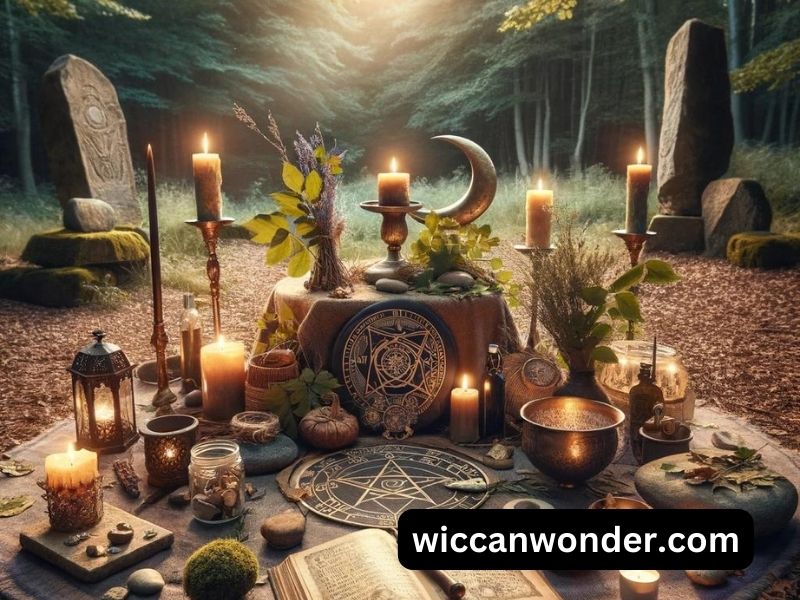
Participating in rituals and ceremonies is an important aspect of Wiccan practice. Wiccans celebrate the changing seasons through festivals known as sabbats, which honor the cycles of the sun and the earth’s natural rhythms. They also observe the moon’s phases through gatherings called esbats, typically held on the night of the full moon. These rituals allow Wiccans to connect with the divine, raise energy, and set intentions for the upcoming weeks or months.
Magic and Spells
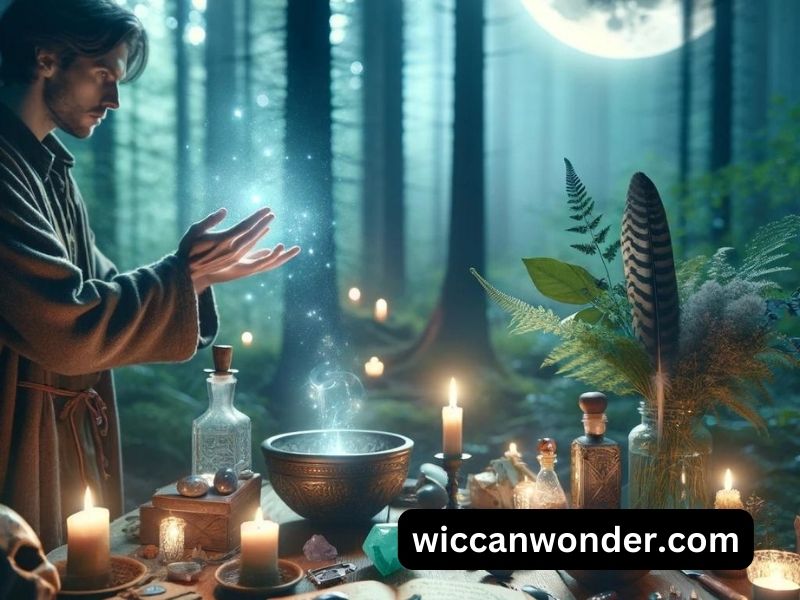
Another essential practice in Wicca is the use of magic and spells. Wiccans view magic as a tool for personal growth and positive change, not as a means to harm or control others. Spells often involve focusing intention, raising energy, and using natural objects such as herbs, crystals, and candles. The purpose is to manifest positive outcomes in alignment with the Wiccan Rede, such as spells for healing, protection, or abundance.
Meditation and Visualization

Meditation and visualization are also significant in Wiccan practice. These techniques help you feel grounded, centered, and connected to your inner wisdom and intuition. Regular meditation can foster a deeper sense of peace, balance, and connection to the divine.
It’s important to recognize that Wiccan practices are highly personal and can vary greatly from one individual to another. Some Wiccans stick to specific ritual structures, while others prefer a more flexible, spontaneous approach. Some practice primarily as solitary practitioners, while others belong to covens or circles that gather regularly to celebrate and share their craft.
As you develop your own Wiccan practice, trust your instincts and allow your heart to guide you. Experiment with different techniques and rituals to find what aligns most strongly with your beliefs and experiences. Remember, the most authentic and powerful practices are those that come from a place of sincerity, respect, and love.
Misconceptions
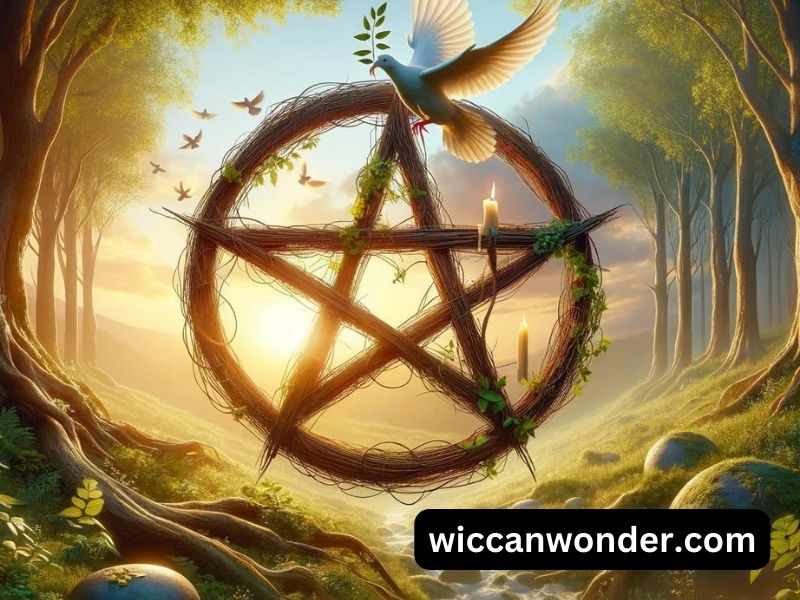
As you learn more about Wicca, it’s important to discuss some of the common misunderstandings people have about this religion. One of the biggest myths is that Wicca is somehow related to Satanism. This is completely false. Wiccans don’t believe in or worship Satan, as Satan is a part of Christian beliefs, not Wiccan ones. In fact, the idea of an all-evil being goes against the Wiccan view of the world, which focuses on balance and the goodness of nature.
Another misunderstanding is that Wicca is evil or harmful. This often comes from people not understanding what magic and witchcraft really mean in Wicca. The truth is that Wiccans have a strict rule that says they should never cause harm to others. The Wiccan Rede, “If it harms none, do what you will,” is a key part of Wiccan ethics. In Wicca, magic is a tool for personal growth and positive change, not a way to control or manipulate others.
It’s also important to understand that Wicca is a diverse religion with many different ways of practicing it. There is no single “right” way to be a Wiccan, and what Wiccans do can be very different from one group or individual to another. Some may have a structured way of joining the religion and following specific rituals, while others may have a more personalized approach that combines different ideas. This diversity is good for the Wiccan community because it allows for many different experiences and understandings.
As you come across these and other misunderstandings about Wicca, try to be patient and understanding. Many people simply haven’t had the chance to learn the truth about this religion. By being kind, honest, and open-minded in your own practice, you can help clear up these myths and help people understand Wicca better.
Diversity within Wicca
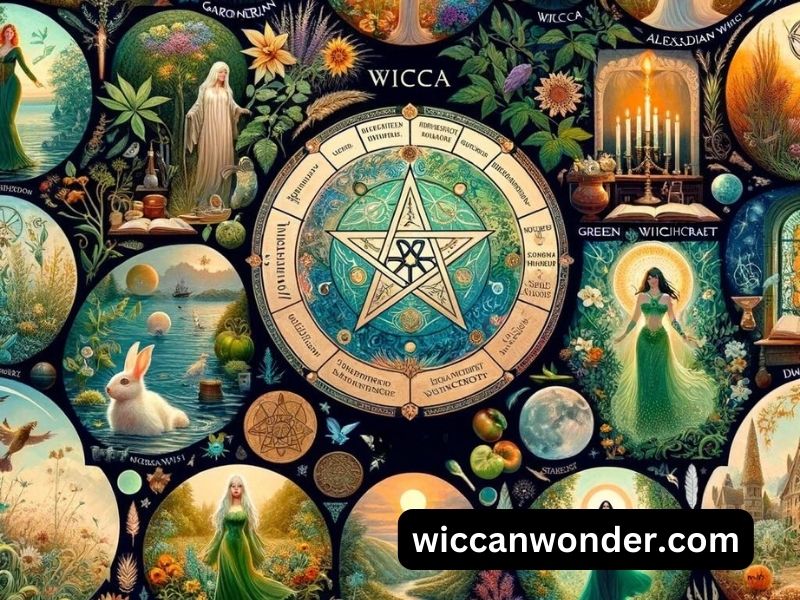
One of the best things about Wicca is how varied it is. As you learn about this spiritual path, you’ll find lots of different traditions. Each one has its own unique practices, beliefs, and history. Some of the most famous traditions are Gardnerian Wicca and Alexandrian Wicca. Gardnerian Wicca started with Gerald Gardner and has a specific way of accepting new members and organizing groups. Alex Sanders started Alexandrian Wicca and includes some ideas from ceremonial magic and Kabbalah.
But there’s so much more than just these two. Within the big Wiccan community, there are many other traditions and paths. Some focus on nature, like Green Witchcraft. Others focus on feminism, like Dianic Wicca. Some Wiccans use ideas from specific cultures, like Celtic or Norse mythology. Others create their own blend of practices and beliefs.
Wiccans also practice their faith in different ways. Some like the structure and sense of community that comes with being in a coven. They find strength and support in having regular rituals and meetings. Others like the freedom to practice by themselves. They create their own rituals and trust their own instincts.
No matter what specific tradition or path a Wiccan follows, they all share some common things. They respect nature, want to grow as a person, care about ethics, and believe in the power of magic and ritual to create change. As you explore the many different aspects of Wicca, remember that there’s no single “right” way to do things. The great thing about this religion is how it can adapt to each person’s unique experiences and ways of expressing themselves. Trust your own instincts and follow your heart. As you discover the practices and traditions that mean the most to you, you’ll create your own personal Wiccan path.
Final Thoughts
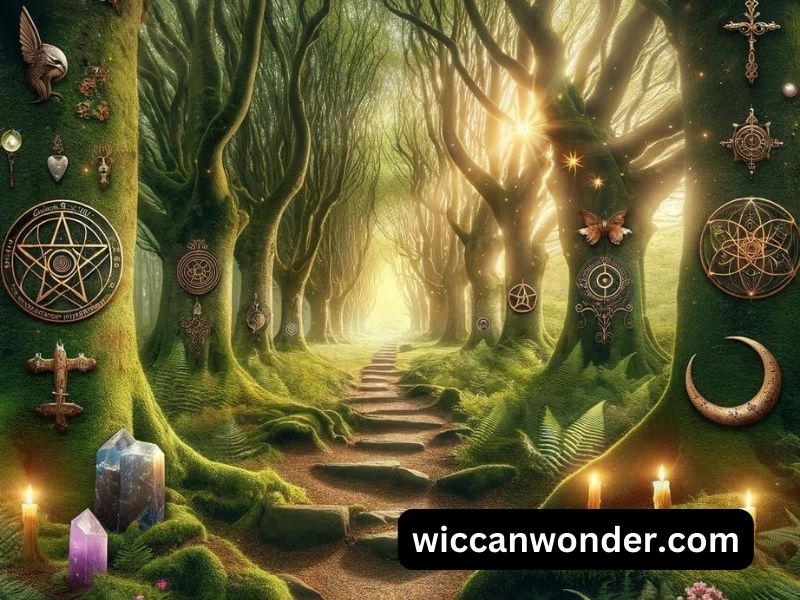
As we’ve explored Wicca’s key beliefs, practices, and diversity, I hope you’ve gained a better understanding of what makes this nature-based spirituality so appealing to many people. At its core, Wicca is a path of personal growth, connection, and respect for the sacred in all things.
Whether you’re drawn to the structured traditions of Gardnerian or Alexandrian Wicca, the solitary practices of the eclectic witch, or any path in between, what matters most is that you approach your spirituality with an open heart and a commitment to living ethically and authentically.
As I continue my own journey of discovery, I’m excited to learn more about the Wiccan traditions and share my experiences with you. But I’m also eager to hear from you!
What aspect of Wicca speaks to you the most? Is it the reverence for nature, the balance of divine feminine and masculine energies, the emphasis on personal responsibility, or something else entirely? How do you feel called to incorporate Wiccan principles and practices into your own life?
Please leave me a comment below and share your thoughts, experiences, and questions. Let’s continue this conversation and support each other as we walk the path of Wicca together.
Remember, the journey of a thousand miles begins with a single step. May your first steps on the Wiccan path be blessed with wonder, wisdom, and love.
Until next time,
Blessed be!
Taianne
P.S. You might have noticed that I signed off with “Blessed be.” This is a common saying in Wicca, used as a greeting, a farewell, and a way to express good wishes. When Wiccans say “Blessed be,” they give blessings to the person they speak to and acknowledge the divine presence in all things. As I learn about Wiccan traditions, I enjoy incorporating this phrase to connect with the community and express my intentions. Feel free to use it, too, if it speaks to you!
Please Share the Love

Welcome to WiccanWonder.com!
I’m Taianne, your guide on this enchanting journey into the realm of Wicca and witchcraft. Inspired by the magical stories of pop culture, I’ve transitioned from a casual fan to a dedicated explorer of Wicca’s true nature—a nature-based religion celebrating the divine, the cycles of nature, and living harmoniously with the earth. Through WiccanWonder.com, I aim to demystify Wicca, separating fact from fiction, and inviting others to explore its rich traditions and practices alongside me. As a fellow seeker, I’m here to share insights, discoveries, and open a space for dialogue and learning. Whether you’re new to Wicca, a seasoned practitioner, or simply curious about magic and spirituality, your presence enriches our journey. Let’s explore the wonder of Wicca together.
Feel free to contact me at Taianne@wiccanwonder.com
Blessed be!
